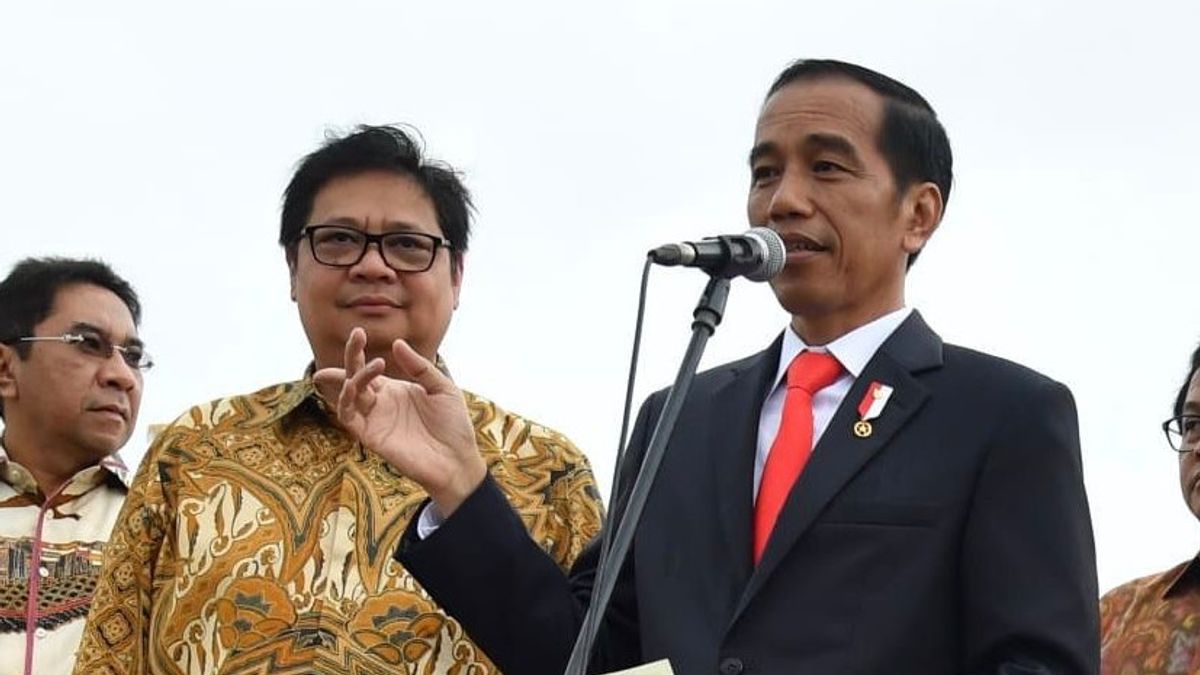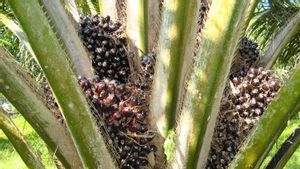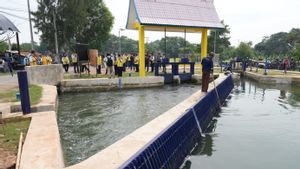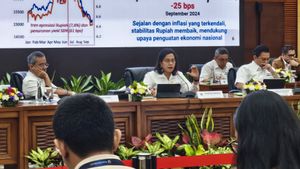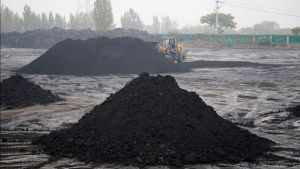JAKARTA - The government continues to evaluate the implementation of Community Activity Restrictions (PPKM) in the Java-Bali and Outside Java-Bali areas. Mainly to prevent an increase in COVID-19 cases during the Christmas and New Year holidays and the entry of a new variant of Omicron to Indonesia.
The number of active cases recorded as of 12 December 2021 was 5,158 cases or 0.12 percent of the total cases, below the global average of 8.10 percent. When compared to peak conditions on July 24, 2021, Active Cases have fallen -99.10 percent.
Daily Confirmation Cases averaged 7 days (7DMA) of 208 cases, with a consistent downward trend, as of 12 December as many as 163 cases, or has decreased -99.71 percent from the peak situation on 15 July 2021. Contributions from Java-Bali were 105 cases (64.42 percent) and Outside Java-Bali as many as 58 cases (35.58 percent).
“The COVID-19 Effective Reproductive Rate (Rt) in Indonesia and on all islands, is under controlled conditions (Rt < 1). Indonesia's Rt is 0.97," said Coordinating Minister for Economic Affairs Airlangga Hartarto, at the PPKM Evaluation Rate Press Conference, Monday, December 13.
Nationally, the percentage of the Recovery Rate (RR) is 96.49 percent, the Case Fatality Rate (CFR) is 3.37 percent, with a decrease in the total number of Active Cases by -98.77 percent.
Development of Conditions Outside Java-Bali
The number of recovered cases (RR), death cases (CFR), and the decrease in the total number of active cases outside Java-Bali, are as follows:
• Sumatra: RR = 96.24 percent and CFR = 3.58 percent, with a decrease (total number of active cases) -98.35 percent
• Nusa Tenggara: RR = 97.46 percent and CFR = 2.35 percent with a decrease of -98.66 percent
• Kalimantan: RR = 96.79 percent and CFR = 3.17 percent with a decrease of -99.74 percent
• Sulawesi: RR = 97.27 percent and CFR = 2.64 percent with a decrease of -99.29 percent
• Maluku and Papua: RR = 97.7 percent and CFR = 1.75 percent with a decrease of -97.58 percent
From the measurement of the COVID-19 Situation Assessment Level in 27 Provinces Outside Java-Bali (as of 11 December 2021) it can be seen that all provinces have very good “Community Transmission”, namely at Level 1, but the conditions are somewhat different when viewed from the “Response Capacity” side. ". This causes the Pandemic Situation Assessment Level per Province: no Province is included in Level 4 and Level 3, then 21 Provinces at Level 2 due to “Medium” or “Limited” Response Capacity, and 6 Provinces at Level 1 with “Adequate” Response Capacity , namely the Riau Islands, West Nusa Tenggara, North Sumatra, West Sulawesi, Jambi, and Maluku.
There are only 7 provinces with a dose-1 level of vaccination at the “adequate (>70percent)” level, namely Riau Islands, Jambi, Bangka Belitung Islands, West Nusa Tenggara, North Kalimantan, and East Kalimantan. Meanwhile, 13 Provinces are at the “Medium (50percent-70percent) level, and 7 Provinces are at the “Limited (<50percent)” level.
Coordinating Minister Airlangga explained “As of December 11, 2021, there are no Level 4 Regency/City. However, there are still 3 Regencies/Cities at Level 3, namely Central Sumba, Bangka and Bintuni Bay. Then, there are 135 Regencies/Cities at Level 2; and Regencies/Cities at Level 1 increase to 248 Regencies/Cities”.
Anticipate the 2021 Nataru Holiday
The government has issued rules to regulate community activities during the Christmas and New Year (Nataru) holidays through the Instruction of the Minister of Home Affairs Number 66 of 2021. The travel rules listed in it are mandatory 2 (two) vaccines and have carried out an antigen test which is valid only 1x24 hours for long trips by public transportation. Meanwhile, those who have not been vaccinated and those who cannot be vaccinated are prohibited from traveling far.
Regarding the restrictions on the 2022 New Year celebrations, it is recommended that celebrations be carried out individually or with families to avoid crowds; it is forbidden to hold a New Year's parade or procession. If you want to visit Shopping Centers or Malls, you must check in with the PeduliLindung application, then the operating hours are extended to 09.00 – 22.00 local time to prevent crowds, but the number of visitors is limited to a maximum of 75 percent of the total capacity, and must implement stricter health protocols.
Meanwhile, the rules for tourist or recreational places must implement health protocols, only allowing visitors with the green category in the PeduliLindung application, limiting visitors to a maximum of 75 percent of capacity, prohibiting celebration parties with crowds, reducing the use of loudspeakers to prevent crowds, and limiting community activities. such as cultural arts performances, which risk causing crowds.
"At this time, Indonesian people are strongly advised not to travel abroad first unless there is a really urgent need. Meanwhile, those who have come from abroad must carry out a 10-day quarantine without exception, either independently or centrally," explained Coordinating Minister Airlangga.
Implementation of Indonesia's G20 Initial Meeting
On the other hand, Indonesia has also successfully held the First G20 Sherpa Meeting in Jakarta, as well as the Finance and Central Bank Deputies (FCBD) Meeting in Bali, as the initial meeting of the series of Indonesian G20 Presidencies. These two meetings were held with strict health protocols and the implementation of a bubble system which was carried out at the arrival airport (separate route), hotels, meeting places, side event venues, and departure airports (separate routes).
All Delegates are required to use the PeduliLindung application, and must carry out tests (PCR and Antigen) every day with "Negative" results to be able to attend the meeting. For the committee involved in the event, after completing the activity, they are asked to self-quarantine, and a PCR test is carried out on D+1 and D+5. Based on the results of PCR Swabs and Antigen Swabs, all 422 delegates and committees who were tested every day had negative results.
Update on Booster Vaccines & Vaccination Programs for Children 6-11 Years
Currently, the evaluation process of homologous booster vaccines from 3 manufacturers (Pfizer, Sinovac, and Astra Zeneca) is being carried out at BPOM, but it is possible to evaluate the heterologous vaccines. The heterologous study is in progress and is expected to be completed in early January 2022. The heterologous booster will be given after the study data is completed as the basis for granting the EUA BPOM.
"The President's direction is to immediately prepare booster vaccines, when they are available and where are the service points," said Coordinating Minister Airlangga.
In addition, the vaccination program for children aged 6-11 years will start from 10 provinces that have met the requirements for general coverage of >70 percent Dose-1 and Elderly coverage >60 percent Dose-1. Provinces that have fulfilled the requirements include Banten, DI Yogyakarta, DKI Jakarta, West Java, Central Java, East Java, East Kalimantan, Riau Islands, West Nusa Tenggara, North Sulawesi, and Bali. Vaccination will use the Sinovac vaccine.
This program will start gradually on December 14, 2021 (Kick Off Program in DKI Jakarta and possibly also in Banten), then focus on early January to February 2022 and after April 2022. The interval between the administration of the COVID-19 vaccine and the vaccine from the immunization program in child is 4 weeks to prevent AEFI at the same time.
Update on PEN Program Budget Realization
The realization of the National Economic Recovery Program (PEN) until December 10, 2021 reached Rp519.69 trillion or 69.8 percent of the Rp744.77 trillion ceiling, or an increase of Rp109.71 trillion from the realization in Quarter III-2021 which amounted to Rp409.98 trillion. If viewed per cluster, the realization is as follows
· Realization of Health Cluster of Rp143.29 trillion (66.7 percent)
· Realization of the Perlinsos Cluster of IDR 152.18 trillion (81.5 percent)
· Realization of Priority Program Clusters of IDR 83.64 trillion (70.9 percent)
· Realization of the MSME and Corporate Support Cluster of IDR 77.73 trillion (47.9 percent)
· Realization of Business Incentive Cluster of Rp62.86 trillion (100 percent)
The realization of the Health Cluster, which amounted to Rp.143.29 trillion, was mainly for Diagnostics (Testing and Tracing) of 69.1 percent or Rp.3.11 trillion, Therapeutic (Incentives and Benefits for Healthcare Workers) of Rp. 16.32 trillion or 86.2 percent, and Vaccinations ( procurement and implementation) of 50.7 percent or Rp29.27 trillion.
Meanwhile, the realization of the Perlinsos cluster of Rp. 152.18 trillion, among others, was used for the Family Hope Program (PKH) of 98.0 percent or Rp. 27.75 trillion from the ceiling of Rp. 28.31 trillion, Food Cards of 83.9 percent or Rp. 41.88 trillion. of the Rp49.89 trillion ceiling, Village BLT of 69.3 percent or Rp19.95 trillion of the Rp28.80 trillion ceiling, and Wage Subsidy Assistance (BSU) of 84.9 percent or Rp7.48 trillion of the Rp8.80 trillion ceiling.
The English, Chinese, Japanese, Arabic, and French versions are automatically generated by the AI. So there may still be inaccuracies in translating, please always see Indonesian as our main language. (system supported by DigitalSiber.id)
